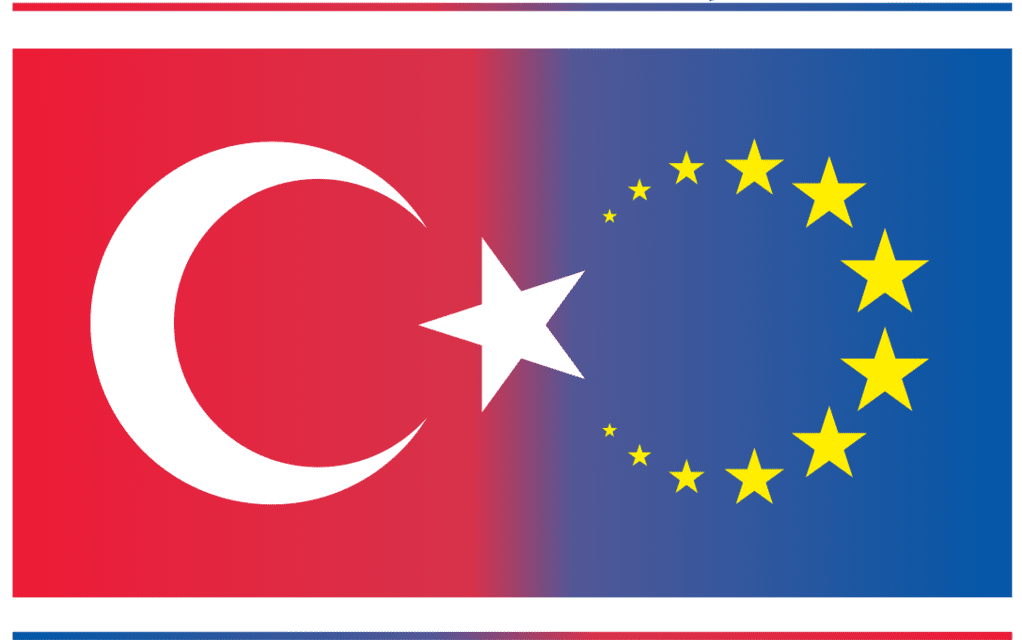
On Tuesday June 7th, the EU Parliament called for the suspension of negotiations with Turkey over EU membership. A decisive majority of 448 MEPs voted to defer Turkey’s request. Their report states that despite Turkey’s claims of wanting accession, it has “consistently gone back on its commitments.”
With only 67 MEP votes against and 107 abstentions, Turkey’s human rights situation remains of clear concern to the legislative body. The EU Parliament pointed to “sustained legal and administrative pressure” on civil society, particularly human rights defenders, lawyers, as well as journalists. It is for this reason that it called on the EU Commission to secure the funding needed to foster “pro-democracy efforts” in Turkey. Its open defiance of the rules upheld by the European Court of Human Rights has been a thorn in the EU’s side.
The EU Parliament acknowledged Turkey’s “willingness to act as a mediator in the Russian war against Ukraine,” as well as its sheltering of the largest refugee population in the world. Yet, until “necessary democratic conditions on human rights and fundamental freedoms, respect of international law and good neighborly relations are met,” it said it would not support any agreement. In recent years, Turkey-EU relations have seen equal straining over tensions with Greece and Cyprus, and Turkey’s role in Syria, among other matters.
Beyond this, Turkey has rankled the West by putting up roadblocks to Finland and Sweden’s application for NATO membership (over their harboring of Kurdish terrorists). Ankara also carves its own path in relations with Russia—the trigger of these countries’ security concerns—with which it maintains a complicated relationship. While it did not follow the West in its sanctioning of Russia to dissuade it from further military action, shortly after the war commenced, Ankara chose to close the Turkish Straits—Black Sea access points—to all navies, and barred Russian military aircraft from its skies. Just before the war, it had sold armed drones to Ukraine, which were subsequently used during its conflict with Russia. Turkey’s welcoming of both Russian and Ukrainian nationals alike, and the money, and therefore business, that they have brought, has continued, if not intensified, ever since.
For this straddling of the fence, Turkey has become well-known; under Erdoğan’s leadership, rather than going all-in with either side, Ankara seems keen on extracting benefits from all sides. However cynical an approach this might be, it works. The EU needs Turkey because of the latter’s geopolitical weight; this is why MEPs were at pains to stress the “vital importance” of cooperation between the EU and Turkey (a NATO member) to bolster that alliance upon which Europe’s security architecture is built. They also asked their military ally to “handle Finland and Sweden’s membership applications in good faith, to engage constructively in efforts to solve possible outstanding issues and to refrain from exerting any undue pressure in this process.”
Preceding the vote, during the Monday debate the prospect of a more amenable, EU-compliant Turkey seemed a pipe dream. Among many statements by MEPs, the one by rapporteur Nacho Sánchez Amor’s (Partido Socialista Obrero Español) proved the bleakest:
If the war clearly marks the division between democracies and authoritarian systems, it is obvious that Turkey is not in our camp, because the model of society it offers is the Russian model; if the war clearly marks the division between countries that defend international relations based on law and not on force of arms, it is obvious that Turkey, with its operations in Nagorno-Karabakh, in Iraq or in Syria, is not in our camp; if the war clearly marks the division between military allies and rivals, it is obvious that Turkey, with its irresponsible veto of Sweden and Finland, is giving the Kremlin a gift … Turkey does not have a problem with Sweden and Finland: Turkey has a problem with any democracy.
After securing the vote for his report, Amor however stressed that “our commitment … is with a country, not with a government,” and that “Turkey is not Erdoğan and Erdoğan is not Turkey.”
My speech today at the plenary debate on the #Turkey report that will be voted tomorrow. The @Europarl_EN won't remain silent in front of the latest violations of fundamental freedoms, no matter what geopolitical role 🇹🇷 plays. https://t.co/foXlNqDrQb
— Nacho Sánchez Amor (@NachoSAmor) June 6, 2022
In Ankara, the decision was ill-received. Turkey’s foreign ministry called the report “unconstructive,” its critique of the state of its democracy “baseless,” and expressed the hope that the EU Parliament does not become a tool for “narrow-minded circles” so that negotiations could be revived.
